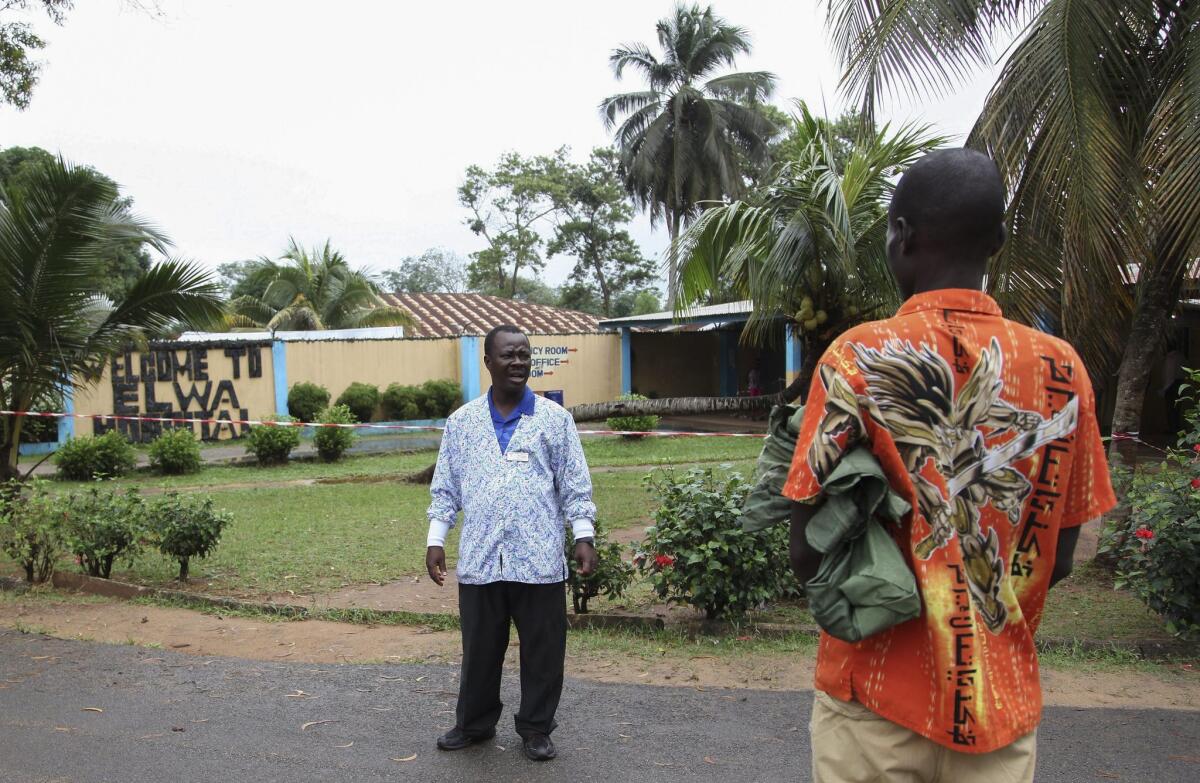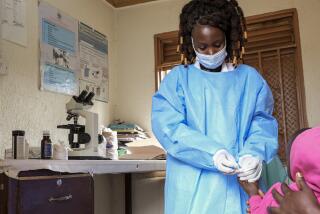Liberia among African nations trying to contain deadly Ebola virus

- Share via
Reporting from Johannesburg, South Africa — Liberia President Ellen Johnson-Sirleaf has closed most of the country’s land borders, restricted public gatherings and quarantined communities that have seen Ebola outbreaks to try to contain the world’s worst outbreak of the deadly virus.
The measures announced late Sunday came after a Liberian official, Patrick Sawyer, 40, flew from Liberia to Nigeria’s most populous city, Lagos, last week, falling violently ill on the plane before collapsing on arrival at the airport. He died Friday of the virus.
There are fears that the incurable disease may gain a foothold in Lagos, with the possibility that passengers or crew may have contracted the illness.
Sawyer’s flight stopped in the Togolese capital, Lome, on the way to Lagos, raising fears the disease may spread to that country as well. World Health Organization officials have been sent to Lagos and Lome to follow up contacts with passengers and crew on the flight, said WHO spokesman Paul Garwood, Reuters reported.
Nigerian airline Arik on Sunday suspended flights to Liberia and Sierra Leone after Sawyer’s death, which amplified fears that the disease may spread to other countries in Africa or elsewhere.
Nigerian health authorities evacuated the hospital where Sawyer died and said Monday it would be closed for a week.
With criticisms that governments in the three West African countries have been slow to respond to the crisis, Johnson-Sirleaf announced the new measures, shutting all but three border points and introducing stringent health checks at those that remain open. She said health tests on all arriving and departing passengers would be carried out at airports.
“No doubt, the Ebola virus is a national health problem, and as we have also begun to see, it attacks our way of life, with serious economic and social consequences,” Johnson-Sirleaf said.
The outbreak is unprecedented both in geographical spread and the numbers of casualties, with 672 deaths since February, according to WHO. Doctors Without Borders, one of the main agencies combating the outbreak in West Africa, has described it as out of control.
Last week three doctors caring for Ebola patients contracted the disease, including Texas doctor Kent Brantly, who has been working at ELWA Hospital in Monrovia for a Christian charity group, the Samaritan’s Purse. An American missionary at the same hospital, Nancy Writebol, from a group called Serving in Mission, also contracted the virus.
A senior Liberian doctor, Samuel Brisbane, has died of the disease, and Sierra Leone’s top doctor, Sheik Umar Khan, has contracted it but was reportedly responding well to treatment, while three nurses he was working with have died.
In Sierra Leone 224 people have died, while the disease has killed 129 in Liberia and 319 in Guinea. Most of the recent cases are in Sierra Leone.
Sierra Leone President Ernest Bai Koroma visited the epicenter of the outbreak in Kailahun on Monday.
The disease kills its victims swiftly, causing fever, vomiting, diarrhea and massive internal bleeding. It is spread through bodily fluids including sweat, and traditional burial methods, including washing the bodies of the dead, are believed to have spread the disease rapidly after the initial outbreak in Guinea, near the border of Sierra Leone. It spread mainly through cross-border trade.
With no cure and a mortality rate in the current outbreak of more than 60%, some activists and health workers have called for steps to offer experimental drugs to patients.
Communities in West Africa are terrified of the disease and in some cases suspicious of medical staff involved in fighting it. Some villages in Guinea are inaccessible to medical staff because local people blame outsiders for bringing death to their communities.
The fear and resistance to treatment has complicated efforts to fight the disease. Some patients, including the first victim in the Sierra Leone capital, Freetown, have fled health facilities because of fears that few people emerge alive.
Critics claim not enough was done by governments and others to educate populations about the disease and the need to seek treatment to help keep it from spreading to others.
Conditions for health workers clad from head to foot in protective gear are horrendous, according to the Samaritan’s Purse. In West Africa, where the warm, rainy season is underway, temperatures in the protective suits reach up to 115 degrees Fahrenheit, according to a statement by the organization this month.
Donning the suits takes 30 minutes and decontamination after treating patients takes another half-hour, the organization said, but even with the most meticulous procedures, health workers are vulnerable to infection.
Follow Africa news on Twitter @RobynDixon_LAT
More to Read
Sign up for Essential California
The most important California stories and recommendations in your inbox every morning.
You may occasionally receive promotional content from the Los Angeles Times.












